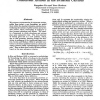Free Online Productivity Tools
i2Speak
i2Symbol
i2OCR
iTex2Img
iWeb2Print
iWeb2Shot
i2Type
iPdf2Split
iPdf2Merge
i2Bopomofo
i2Arabic
i2Style
i2Image
i2PDF
iLatex2Rtf
Sci2ools
117
Voted
AAAI
1992
1992
Concurrent Actions in the Situation Calculus
We propose a representation of concurrent actions; rather than invent a new formalism, we model them within the standard situation calculus by introducing the notions of global actions and primitive actions, whose relationship is analogous to that between situations and fluents. The result is a framework in which situations and actions play quite symmetric roles. The rich structure of actions gives rise to a new problem, which, due to this symmetry between actions and situations, is analogous to the traditional frame problem. In [Lin and Shoham 19911 we provided a solution to the frame problem based on a formal adequacy criterion called "epistemological completeness." Here we show how to solve the new problem based on the same adequacy criterion,
Related Content
| Added | 06 Nov 2010 |
| Updated | 06 Nov 2010 |
| Type | Conference |
| Year | 1992 |
| Where | AAAI |
| Authors | Fangzhen Lin, Yoav Shoham |
Comments (0)

